Culling Bookshelves for a Move (or in General)
What to keep and what not and why/when physical books are important to hold onto. (Because some of us, like me, are completely made of books!)
If you read my note from last week you know that I just uprooted myself from Brooklyn and put my belongings into storage, while I figure out my future relationship to the United States.
These belonging include probably at least 2,000 books.
But before they were 2,000 books, they were probably over 3,000 books. (Yikes!)
It was a painful process to get rid of so many books, yet I knew it was not practical to hang onto all of them. But culling my books and still deciding to keep so many, also gave me insight into what books are to me (in general), which books I can’t bear to part with and why (even if I tried hard to), and also why books are important to hang onto—as objects, as possessions, as memories. As history—my own history. That my collection of books that has grown over the years of my existence, is also the story of a life—a childhood, a relationship with a parent and family, a devoted student who eventually went on to get a PhD, and a person who’d become and is still now a writer.
I’ve always had too many books—ever since I was a kid. It’s also true I am forever trying to get rid of some because I am also forever acquiring more and needing room. I can’t help myself. I love books and yes, sometimes I acquire them simply because I love their covers. Don’t you?
But for over twenty years I lived in my Brooklyn apartment and I had massive bookshelves, really the bookshelves of a NYC apartment-dweller’s dream. I could not only fit the gazillion copies of my own books in every language they’ve been translated on those shelves, but I could also fit all the books I’ve taken with me through the many stages of my life—including post-childhood, post-Georgetown undergrad, and post-PhD.
So it was wonderful while I lived there and terrible when I had to move. I knew I couldn’t box them all and I agonized over how to get rid of so many.
I asked friends for advice about how to go through this process and I got a variety of different answers as to method:
That I needed to remember that I could buy nearly any book again, so even books I had loved I should get rid of because I could get new copies once I moved into my new U.S. home or if I needed to read them in Barcelona. So be super ruthless and get rid of way more than I think I should.
In the same vein, some academic friends and colleagues told me to watch out for those books from grad school that are out of print, and hang onto those—if I especially loved them.
In cases of books related to former study, to use the criteria that if I had written notes in them and underlined a lot then I should keep those.
If I thought I would reread a book then I should/could keep it—but I had to be ruthlessly realistic about whether or not I ever would do this.
One friend gave me the sort of Marie Kondo-answer: that I should hold each book in my hand and if it brought me joy I should keep it.
What I did and what I didn’t do when culling my shelves:
There was a large contingent of books I quickly and easily got rid of—books I didn’t like very much, books I had no sentimental feeling about, books I’d never read yet after maybe 5, 10, even 15 years of having yet not reading, I was honest and admitted I’d probably never read them ever.
But the more I whittled, the more difficult this job became.
Regarding the above notion that books can always be rebought: I knew this was true in most cases, and I also convinced myself that if I kept to this method of culling, by eventually re-buying books I would be supporting those authors multiple times, financially, which is good. I held this idea in my mind most of all as I tried to make decisions about what would go and what would say—that so many of these books I could rebuy. I really could!
But often I could not part with certain books because:
I’d loved them excessively, I even had flash memories of where/when I read them.
They were books written by dear friends, often first books by those friends.
They were by authors who have written many books and over the years I had collected—and read—nearly everything they’d written. (These include: Tana French, Jenny Han, Sarah Dessen, Megan Whalen Turner, Philip Pullman, Tamara Pierce, L.M. Montgomery, Gregory Maguire.)
They were books that influenced my own writing of books, mentor texts, books that inspired me, books that had helped me remember what good books are.
Could they all be rebought? YES.
Did I decide to part with my own copies? NO.
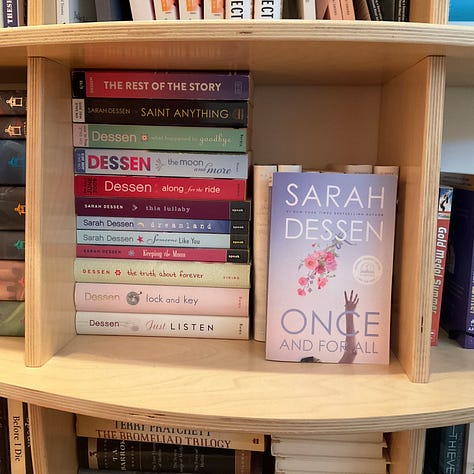
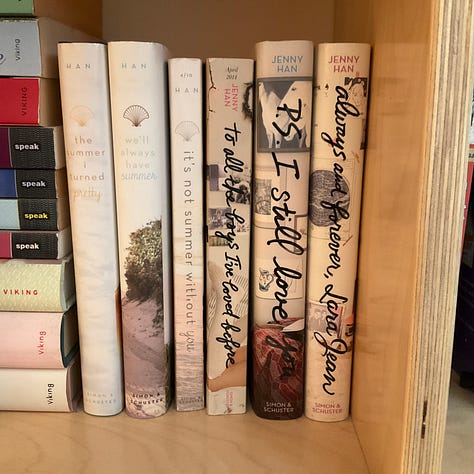
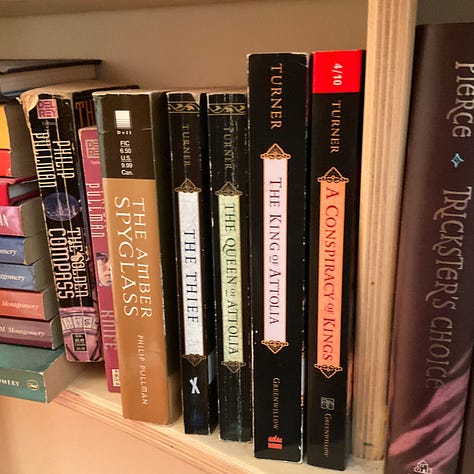
I am proud to say that I did get rid of a lot, including being REALLY honest about some of those grad school books, of which I had (too) many. But I used that rule a lot from academic colleagues—if I’d written a lot in them, I kept them, and if I loved them and they were out of print, I kept them.
The major benefits of this process to my reading life and understanding of the importance of physical books:
First, it led to discovery—or maybe better said, rediscovery. I found my two most recent reads during this process—reads that actually re-ignited my rather stagnant reading life these last couple of years. It had been a long while since I’ve read books I’ve adored, honestly.
As I was going book by book I came across a galley of Elizabeth Gilbert’s first novel, The Signature of All Things from 2013 (!!) that I had never bothered to read. Yet I had hung onto it because I like Elizabeth Gilbert’s writing so much. AND: I actually put it into the donation pile. Yet as I kept culling it nagged at me, and so I went to the donation pile and plucked it off and actually went and stuck the galley into my travel bag for the post-move trip.
THANK GOD I saved it. Dear reader, have you had the pleasure of diving into The Signature of All Things? If you have not, you are in for a treat. I cannot believe I nearly got rid of this extraordinary read. I loved it with my whole heart. I think it’s one of my favorite novels ever. It is a true delight. As I read and loved and read and loved, I nearly could not believe I’d nearly given it away. That it sat on my shelf for OVER 10 YEARS and I’d never read it.
The other wonderful re-discovery was The Jane Austen Project by Kathleen A. Flynn, which came out in 2017 and I’d remembered reading and loving. This time, I just stuck it next to The Signature of All Things in my travel bag and left it at that. I just finished rereading it and it was such a pleasure. I enjoyed it just as much. I’ve now read two wonderful novels in a row!
It felt like I had suddenly unearthed hidden treasures in my own home. How many treasures do you hold in your home that you have yet to allow yourself to enjoy?
Second, the process of culling made me remember how much I love reading nonfiction—not just memoir, but like, philosophy and theology. It made me reconnect to that part of my background and resolve to intentionally cultivate that form of reading in my life again. I chose a selection of books to bring to Barcelona toward this end.
Third, the fact that I knew that I could rebuy books and yet I kept so many books anyway, made me realize that the physical books themselves—books I’ve loved and the actual ones I read with my own eyes and processed with my brain and who made their way into my heart—are part of who I am as a person. That I could never “rebuy” that particular moment. That to part with those specific copies of books is to part with something of my own self and history.
That I am, quite literally, made of books.
Lastly, this process made me realize that I am a collector of physical books in an ever-more digital world. That we are heading toward a world where people have fewer and fewer physical books and while I understand the practicalities of this, books are a physical part of my home—always. They are part of the ambiance of my life wherever I am—in stacks around the house on the arms of chairs, on side tables, on shelves. That they add color and whimsy to my surroundings. That I like to reach up and out and take them into my hands and hold them there. That it brings me pleasure to see them with my eyes.
That as AI takes over the world, that these physical objects written and made by actual people are special.
That books are some of my most special possessions. More special than all the gold and jewels and expensive possessions a person might buy. And that it’s not only fine that I kept so many (if also a bit inconvenient). That it’s important I did because it helped me understand, intellectually and in a heart-way why I am so attached to so many, and a bit more about who I am today, because of these specific possessions collected over a lifetime.
***
If you have thoughts/advice on culling and keeping books, please share! I’d love to know your thoughts, your processes, your ideas about keeping and giving away books. And thanks for stopping by as always, especially if you’ve gotten all the way here. Also, if you’re a new reader, welcome, welcome!
xoDonna





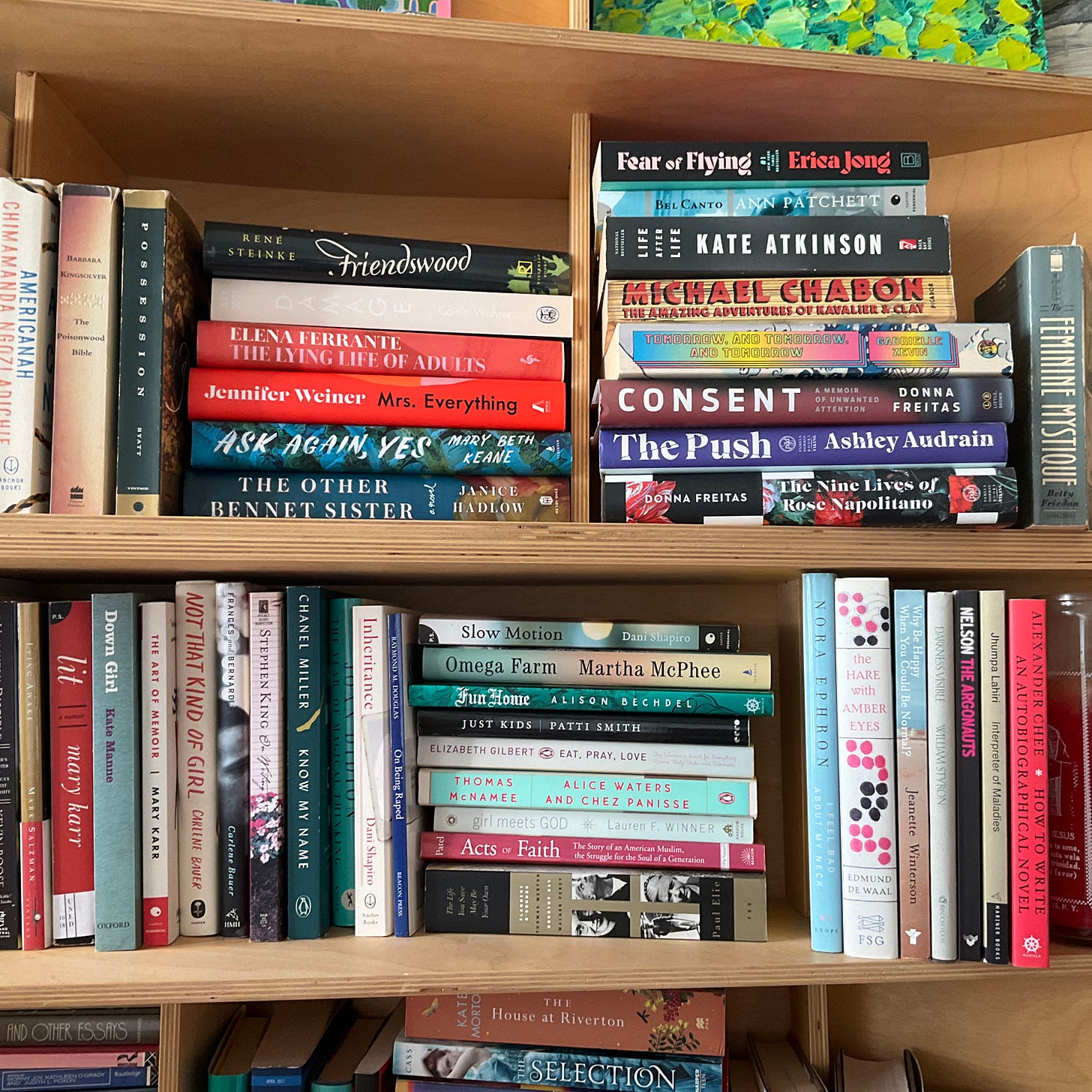
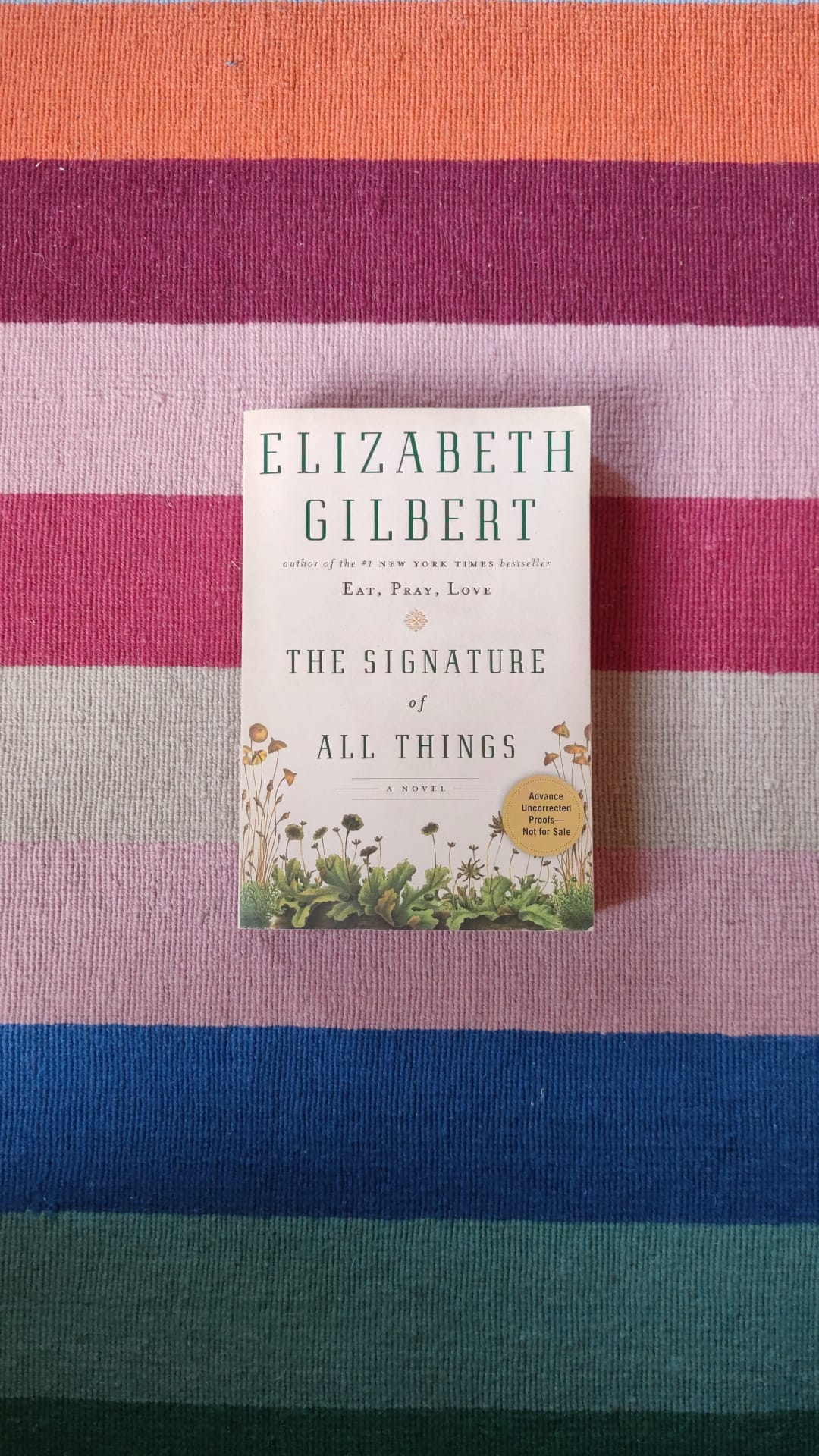
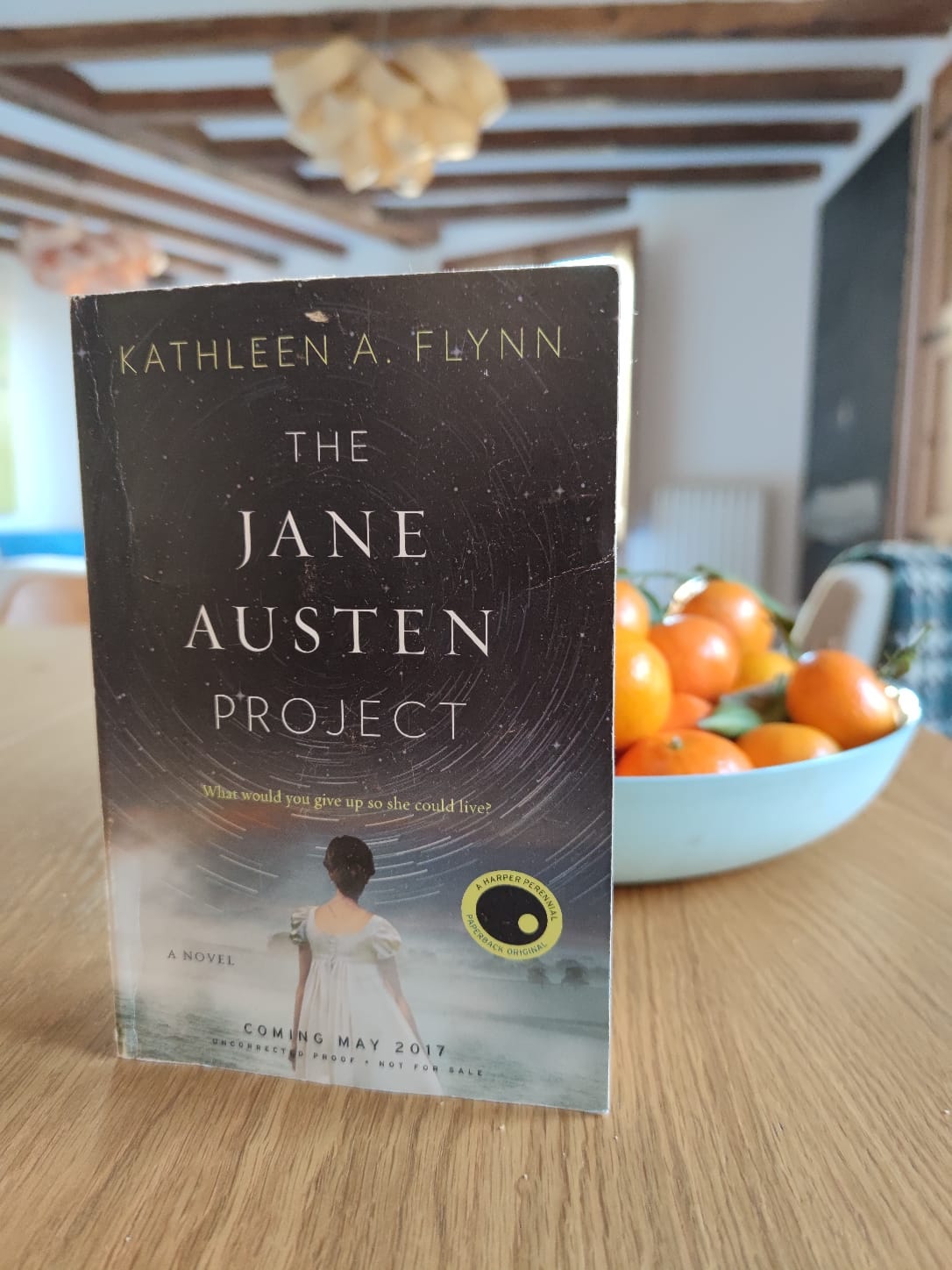
I loved the signature of all things. So deeply engrossing on many levels and when I recently visited Kew Gardens again I thought of the whole place in a very different way. I also always think of it when I see beautiful patterns of moss.